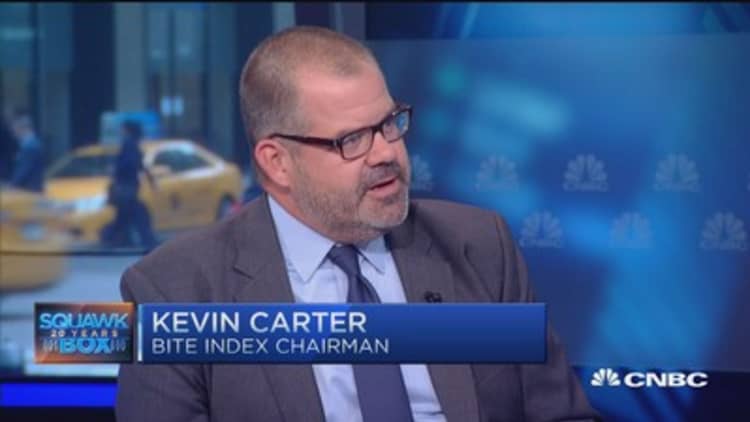


The holiday season is almost here, and so much of it will be beyond your control. Like being silently judged by your entire extended family, pretending you love socks, or dealing with that guy with rotten-milk breath your cousin inexplicably married.
So it's a good time to take control of what you can, such as your investments.
If you have not been keeping a close eye on ETFs, some new niche ETFs are worth reviewing for their novelty alone. Which is to say they could be hitting on big, investable themes of the future, or could prove to be miserable failures that reinforce the cynical view that ETF sponsors are running out of ideas that actually make investing sense.
Only one way to find out.
Lever up that hacking exposure!
Most Americans fear hacking, and most securities regulators fear ETFs that take leveraged bets on markets. So why not combine the two fears into one?
Direxion's Daily Cyber Security Bull 2x ETF (HAKK) provides leveraged exposure to the ISE Cyber Security Index of technology and service companies. A sister fund launched the same day, the Daily Cyber Security Bear 2x ETF (HAKD). Both seek 200 percent of the index return — either positive or negative.
"HAKK and HAKD play off the success of HACK," said Todd Rosenbluth, S&P Capital IQ's director of ETF and mutual fund research. "We've seen other bull and bear ETFs, but I can't recall one so niche-focused. ... These ETFs are going to rise and fall more dramatically."
Zacks investment director of ETF Research Neena Mishra, said some of the cybersecurity stocks look sort of pricey now. "At the same time, the industry is gaining a lot of importance, and the need for cybersecurity solutions will continue to rise," she said.
Matt Hougan, CEO of ETF.com, said he is a fan of Direxion and praised it for running great funds that do exactly what the company states the ETFs will do, but he has concerns. "Buying these ETFs is like drinking eight Red Bulls and going to a roller derby," Hougan said. "You don't know what will happen, but you can be sure it'll involve lots of pain." Hougan said the problem is that levered funds perform poorly in volatile markets, by definition, and these funds are in a very volatile portion of the market.
So far, the hacking skeptics are winning — HAKD is up 4 percent since its launch, while HAKK is down 8 percent.
HAKK charges 99 basis points and has accrued $3.7 million since launching September 16. HAKD charges 80 basis points and has gathered $4.1 million.
Defining Big Data
PureFunds hit it big this past year with the Cyber Security ETF (HACK), launched in November 2014. The launch was clearly a theme that has resonated with investors — HACK has taken in more than $1 billion in assets. But cybersecurity stocks have come back down to earth — this quarter's earnings were mixed for the sector. The ETF is flat year-to-date, not keeping pace with the broad technology index.
So what does the buzziest tech ETF of the past year do for an encore? Launching leveraged versions of its own hacking fund has already been taken.
PureFunds' ISE Big Data ETF (BDAT) tracks firms that collect and analyze large-scale data. Its 33 holdings include data sleuths, such as IBM and SAP. Chinese Internet search-engine company Baidu is its biggest holding after SAP.
FactSet ETF analyst Paul Britt called BDAT "HACK's unloved sister fund." He said the challenge with niche ETFs is pure-play exposure, and "BDAT does a better job than some," but the definition of "big data" across the ETF's holdings is broad. For example, BDAT holds Facebook, Twitter and LinkedIn, which most investors think of as social media stocks rather than big data firms. "Investors haven't caught on," Britt said. Britt noted that his employer, FactSet, is among the stocks held in BDAT, as it mines data in the financial sector. The ETF also holds credit-scoring company Fair Isaac.
Rosenbluth noted that other holdings, like professional services firms Dun & Bradstreet and Yahoo, "may not be significantly driven by big data."
The fund launched during the summer and has accrued only $2.4 million since. Its expense ratio is 75 basis points.
$2.4 million served
The Restaurant ETF (BITE), from ETF Managers Group, tracks the performance of all U.S.-listed restaurant companies. BITE's holdings include giants like Starbucks and McDonald's, along with smaller restaurant chains, such as Buffalo Wild Wings, all with equal weighting. "Equal weighting helps keep the giant firms from dominating the basket," Britt said.
The ETF is a new way to bet on an optimistic view of consumer spending in the U.S.
"I always wondered why there was no U.S. ETF focused exclusively on restaurants," Mishra said. "Thanks to savings from lower gas prices, consumers have been spending more money on eating out, boosting these stocks." But Mishra also wondered if it's too late to play this trend. "These stocks did quite well this year, and some of them look rather expensive now. These companies also face increasing wage pressure."
Buffalo Wild Wings, for example, is down 16 percent this year. BITE is down 7 percent since its launch.
Vanguard's Consumer Discretionary Index Fund (VCR) has an 11 percent allocation to restaurants, but an investor might add BITE to supplement it, Rosenbluth said. Several fast-casual restaurants have come to market recently, so there's variety in its holdings. "Some of the smaller holdings are volatile, while larger holdings offer stability," he said.
BITE has gathered $2.4 million since launching October 28 and charges 75 basis points. Mishra said she thought the expense ratio was a little high. Vanguard's consumer discretionary index charges 12 basis points.
Betting on a cure for cancer
Loncar's Cancer Immunotherapy Index (CNCR) equal-weights about 30 U.S. and European companies producing, or are in clinical trials, for cancer immunotherapy drugs.
"I think cancer immunotherapy is a phenomenal area of science, with enormous therapeutic promise," Hougan said. He said that CNCR seems well constructed but advised against making the fund a large part of total holdings. "Niche portfolios should only represent a niche percentage of your portfolio, if any," he said.
Britt compared it to the BioShares Biotechnology Products Fund (BBP), BioShares Biotechnology Clinical Trials Fund (BBC) and ARK ETFs' Genomic Revolution Multi-Sector ETF (ARKG). "Another super-narrow niche play in biotech," Britt said. "I'd expect a volatile ride."
Biotechnology stocks have been hurt this year with the focus from regulators on drug costs and after a very hot market for biotech stocks cooled off, but CNCR launched at the bottom and, as a result, is up 16 percent since its mid-October launch, though far too short a track record to be worthy of much notice. ARKG is down near-3 percent since its 2014 launch, while BBP and BBC are up 16 percent and 8 percent, respectively, since launching in December 2014.
"This is a highly specialized sub-segment of the health-care sector, with high risks and high rewards potential," Mishra said. "Its equal weighting ensures suitable exposure to smaller companies with better growth outlook. I would watch this newly minted ETF to see if it gathers enough assets and starts trading in decent volumes, before I invest."
It charges 79 basis points and has accrued $13.6 million since launching October 13.
—By Joe D'Allegro, special to CNBC.com





